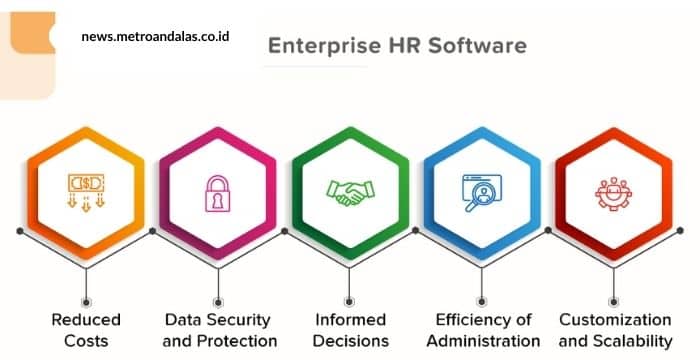Introduction
news.metroandalas.co.id | Enterprise HRIS Software is a comprehensive human resources management (HRM) software solution designed for large organizations. It typically includes a wide range of features and functionality to support all aspects of HR, including employee data management, payroll processing, benefits administration, performance management, and talent acquisition.
In this guide, we will discuss the benefits, features, types, and vendors of enterprise HRIS software. We will also provide tips for selecting and implementing the right software for your organization.

Benefits of Enterprise HRIS Software
Enterprise HRIS software offers a number of benefits to large organizations, including:
- Improved efficiency and productivity: Enterprise HRIS software can automate many HR tasks, freeing up employees to focus on more strategic work.
- Increased accuracy and compliance: Enterprise HRIS software can help organizations to ensure that they are in compliance with all applicable laws and regulations.
- Enhanced decision-making: Enterprise HRIS software can provide organizations with insights into their workforce that can be used to make better decisions about hiring, compensation, and other HR matters.
- Improved employee engagement and satisfaction: Enterprise HRIS software can help organizations to create a more positive and productive work environment for employees.
Features of Enterprise HRIS Software
Enterprise HRIS software typically includes a wide range of features and functionality, including:
- Core HRIS features: These features are essential for basic HR operations, such as employee data management, payroll processing, and benefits administration.
- Employee data management: This includes storing and managing employee information, such as contact information, job history, and performance reviews.
- Payroll processing: This includes calculating and paying employee wages, deductions, and taxes.
- Benefits administration: This includes managing employee benefits, such as health insurance, retirement plans, and paid time off.
- Employee data management: This includes storing and managing employee information, such as contact information, job history, and performance reviews.
- Advanced HRIS features: These features provide additional functionality to support more sophisticated HR needs, such as performance management, talent acquisition, and succession planning.
- Performance management: This includes tracking employee performance and providing feedback.
- Talent acquisition: This includes sourcing, recruiting, and hiring new employees.
- Succession planning: This involves identifying and developing high-potential employees for future leadership roles.
- Performance management: This includes tracking employee performance and providing feedback.
Types of Enterprise HRIS Software
Enterprise HRIS software can be either on-premise or cloud-based.
- On-premise HRIS software: This software is installed and hosted on the organization’s own servers.
- Cloud-based HRIS software: This software is hosted and managed by a third-party vendor and accessed over the internet.
Vendors of Enterprise HRIS Software
There are a number of vendors that offer enterprise HRIS software. Some of the top vendors include:
- Oracle
- SAP
- Workday
- ADP
- PeopleSoft
Selecting and Implementing Enterprise HRIS Software
When selecting and implementing enterprise HRIS software, there are a number of factors to consider, including:
- The size and complexity of your organization: The software you need will depend on the size and complexity of your organization.
- Your specific HR needs: The software you choose should meet your specific HR needs, such as payroll processing, benefits administration, and performance management.
- Your budget: Enterprise HRIS software can be expensive, so it is important to set a budget before you start shopping.
Once you have selected a software vendor, you will need to implement the software in your organization. This process can be complex, so it is important to work with a qualified consultant.
Conclusion
Enterprise HRIS software is a powerful tool that can help large organizations improve their HR operations. By selecting the right software and implementing it effectively, organizations can gain a number of benefits, including improved efficiency, accuracy, and compliance.
Here are some additional tips for selecting and implementing enterprise HRIS software:
- Involve stakeholders: When selecting and implementing enterprise HRIS software, it is important to involve all stakeholders, including HR staff, managers, and employees. This will help to ensure that the software meets the needs of everyone who will be using it.
- Create a timeline and budget: Once you have selected a software vendor, create a timeline and budget for the implementation process. This will help to keep the project on track and avoid any surprises.
- Communicate with employees: Throughout the implementation process, it is important to communicate with employees about the new software. This will help to reduce anxiety and ensure that everyone is prepared to use the new system.
- Provide training: Once the software has been implemented, provide training to all employees on how to use it. This will help to ensure that everyone is able to use the software effectively.
- Get feedback: After the software has been implemented, get feedback from employees on how they are using it and what they like or dislike about it. This feedback can be used to improve the software and the implementation process in the future.
By following these tips, you can select and implement enterprise HRIS software that will meet the needs of your organization and help you to improve your HR operations.